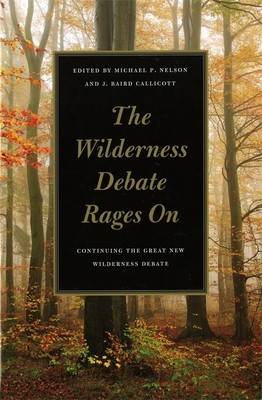
- We will send in 10–14 business days.
- Publisher: University of Georgia Press
- ISBN-10: 0820331716
- ISBN-13: 9780820331713
- Format: 15.5 x 23.4 x 4.6 cm, softcover
- Language: English
- SAVE -10% with code: EXTRA
The Wilderness Debate Rages on (e-book) (used book) | bookbook.eu
Reviews
Description
Ten years ago, The Great New Wilderness Debate began a cross-disciplinary conversation about the varied constructions of "wilderness" and the controversies that surround them. The Wilderness Debate Rages On will reinvigorate that conversation and usher in a second decade of debate.
Like its predecessor, the book gathers both critiques and defenses of the idea of wilderness from a wide variety of perspectives and voices. The Wilderness Debate Rages On includes the best explorations of the concept of the concept of wilderness from the past decade, underappreciated essays from the early twentieth century that offer an alternative vision of the concept and importance of wilderness, and writings meant to clarify or help us rethink the concept of wilderness. Narrative writers such as Wendell Berry, Scott Russell Sanders, Marilynne Robinson, Kathleen Dean Moore, and Lynn Maria Laitala are also given a voice in order to show how the wilderness debate is expanding outside the academy. The writers represented in the anthology include ecologists, environmental philosophers, conservation biologists, cultural geographers, and environmental activists. The book begins with little-known papers by early twentieth-century ecologists advocating the preservation of natural areas for scientific study, not, as did Thoreau, Muir, and the early Leopold, for purposes of outdoor recreation. The editors argue that had these writers influenced the eventual development of federal wilderness policy, our national wilderness system would better serve contemporary conservation priorities for representative ecosystems and biodiversity.EXTRA 10 % discount with code: EXTRA
The promotion ends in 17d.10:50:32
The discount code is valid when purchasing from 10 €. Discounts do not stack.
- Publisher: University of Georgia Press
- ISBN-10: 0820331716
- ISBN-13: 9780820331713
- Format: 15.5 x 23.4 x 4.6 cm, softcover
- Language: English English
Ten years ago, The Great New Wilderness Debate began a cross-disciplinary conversation about the varied constructions of "wilderness" and the controversies that surround them. The Wilderness Debate Rages On will reinvigorate that conversation and usher in a second decade of debate.
Like its predecessor, the book gathers both critiques and defenses of the idea of wilderness from a wide variety of perspectives and voices. The Wilderness Debate Rages On includes the best explorations of the concept of the concept of wilderness from the past decade, underappreciated essays from the early twentieth century that offer an alternative vision of the concept and importance of wilderness, and writings meant to clarify or help us rethink the concept of wilderness. Narrative writers such as Wendell Berry, Scott Russell Sanders, Marilynne Robinson, Kathleen Dean Moore, and Lynn Maria Laitala are also given a voice in order to show how the wilderness debate is expanding outside the academy. The writers represented in the anthology include ecologists, environmental philosophers, conservation biologists, cultural geographers, and environmental activists. The book begins with little-known papers by early twentieth-century ecologists advocating the preservation of natural areas for scientific study, not, as did Thoreau, Muir, and the early Leopold, for purposes of outdoor recreation. The editors argue that had these writers influenced the eventual development of federal wilderness policy, our national wilderness system would better serve contemporary conservation priorities for representative ecosystems and biodiversity.

Reviews